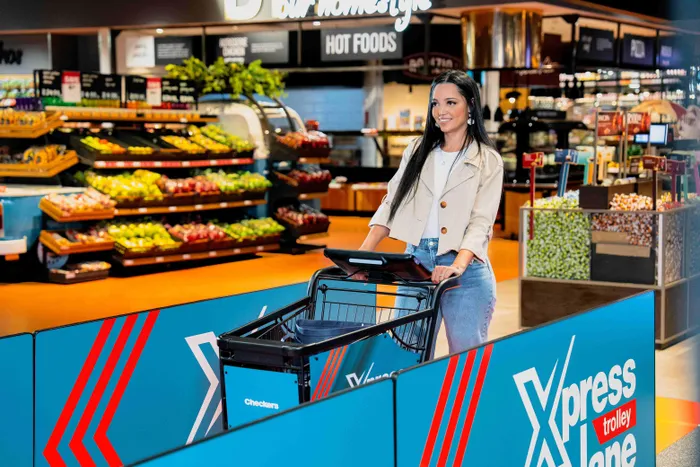Smart shopping trolleys: How AI is shifting power from consumers to retailers

Checkers has launched South Africa’s first smart shopping trolley.
Image: Supplied.
At some point groceries will be delivered at your doorstep based on years of shopping data collected by retailers. The so called smart trolley, or the Xpress Trolley, by Checkers and Shoprite is an important step towards such a future. It started with the rewards card that has also been collecting data about shopping habits and behaviour.
Consumers have not yet seen the full effects of this development within the retail sector. The latest product by ShopriteX is another shiny thing launched by a group of innovators within the Shoprite Group. They have designed the cart to let customers scan items as they shop, see a real-time running total, pay directly on the trolley, and receive in-store navigation and personalised promotions.
It is claimed that all of this is aimed at creating a smoother, tech-driven retail experience. It also means that consumers decision to buy will be heavily influenced by the retailer's technology.
The shopping experience in the future will be automated. This is good for the retail sector if more adopt similar technologies. Such technology will enable them to plan better based on their understanding of what a consumer has bought before. Retailers will be able to better predict what consumers will buy in the future which may improve their bottom line. What does this really mean for consumers?
To some extent it means that when smart trolleys are fully functional across the retail sector the buying power will shift from consumers to brands. A consumer will not only buy because they truly need the goods. Brands will have more abilities to nudge a consumer towards their products. Consumers will have more responsibility to know what they need.
As for cashiers, their role will also shift. Based on an innovative store concept launched by Woolworths, the Food Emporium, it seems retail stores will provide concierge services to guide consumers throughout their shopping experience. This is probably the next role for those who currently serve as cashiers.
The latest innovation by the Shoprite Group is something that will be likely adopted by other retailers. Already, some retail store shelves are already detecting the movement of products. They collect data and send it to manufacturers to predict the demand. This is all about artificial intelligence entering the retail sector.
AI is already touching most retail experiences—creating smooth shopping experiences that customers love. When a shopper visits an online store, AI ensures they're greeted with personalised offers based on their past purchases. If they’re interested in a product, AI can even provide helpful updates, like notifying them when stock is low. In grocery stores, AI plays a vital role in keeping shelves stocked with a wide range of products, ensuring the thousands of different products are fresh and available for customers' needs.
To stay competitive, retailers must take both customer experience and operational efficiency to a new level - and, increasingly, they’re looking to AI tools to help them get there. In fact, it’s anticipated that the use of artificial intelligence in retail will grow from $11.83 billion to $54.92 billion by 2033. AI technologies such as machine learning and natural language processing are behind innovative shopping features that engage and delight customers and entice them to come back for more.
Meanwhile, advanced demand forecasting and predictive analytics tools allow retail businesses to revolutionise their use of data to fuel informed decision-making. Real-time insights help them streamline operations, reduce costs, and keep pace with volatile markets by building responsive and resilient supply chains. Welcome to the new retail world. As a retailer you better adopt AI now or else you will be left behind.

Wesley Diphoko is a Technology Analyst and Editor-in-Chief of Fast Company (South Africa) magazine.
Image: Supplied
Wesley Diphoko is a technology analyst and the Editor-In-Chief of FastCompany (SA) magazine.
*** The views expressed here do not necessarily represent those of Independent Media or IOL.
BUSINESS REPORT